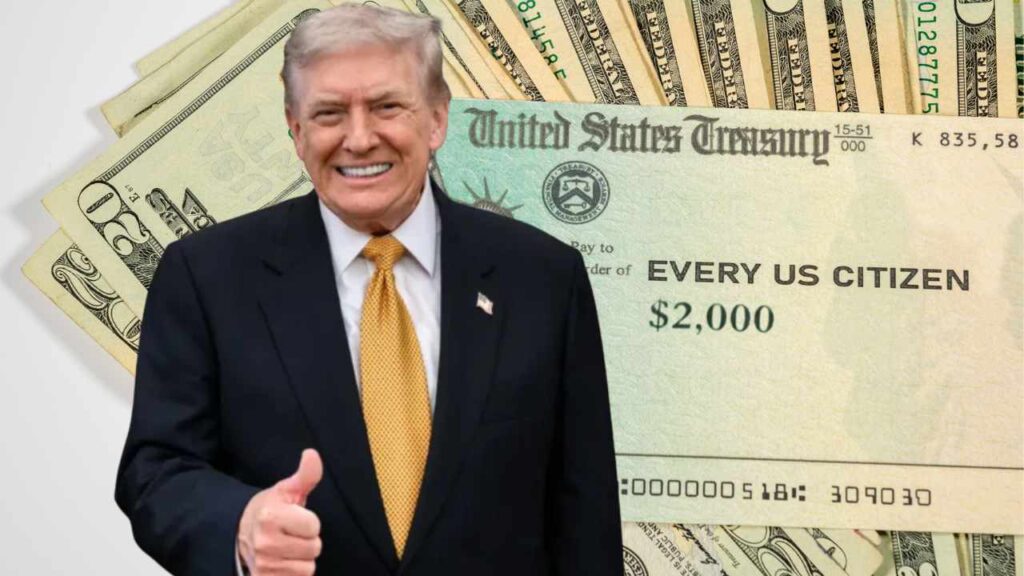President Donald Trump on Sunday unveiled plans to implement stimulus checks that would deliver at least $2,000 per person to most U.S. citizens, funded by revenue generated from expanded tariffs on foreign imports.
The proposal, presented as a tariff dividend, excludes high-income individuals and seeks to redistribute the value captured from international trade transactions, offering direct economic relief similar to the stimulus checks distributed during the COVID-19 pandemic.
What Trump said about $2,000 stimulus checks
In a post on his social media network Truth Social, shared over the weekend, Trump described the initiative as a decisive step toward reducing the national debt and supporting ordinary families.
“People who oppose tariffs are fools,” the president wrote, before detailing his administration’s recent accomplishments: a country with low inflation, a stock market at record highs, and investment plans that are driving factory construction across the United States.
According to his message, tariff revenues would amount to “trillions of dollars,” allowing not only the payment of these stimulus checks, but also the amortization of the federal debt, which exceeds 38 trillion dollars.
Stimulus checks: Trump already distributed payments in the past
The announcement comes at a delicate time for US trade policy. Since April of this year, following the declaration of “Liberation Day,” the Trump administration has imposed tariffs ranging from 10% to 50% on products from countries such as China, Canada, Mexico, and the European Union.
These measures, authorized under the International Emergency Economic Powers Act, raised $195 billion in fiscal year 2025, a 20% increase over the previous period, according to Treasury Department data. Analysts at the Yale Budget Lab project that these tariffs could generate up to an additional $2.6 trillion between 2026 and 2035, although such estimates depend on the stability of global trade and potential international retaliation.
How likely is it that we’ll receive stimulus checks soon?
However, the viability of these stimulus checks faces immediate obstacles. The U.S. Supreme Court is currently reviewing the executive authority to impose such tariffs, with oral arguments presented last week. Both conservative and liberal justices expressed reservations about the scope of the law invoked by the White House.
An unfavorable ruling could invalidate a significant portion of the projected revenue, which Trump, in an interview with “60 Minutes,” described as a “very sad day” for the national economy. The president has hinted that, if necessary, he would explore “other legal means” to sustain the plan.
Details about these potential payments are still pending
Trump did not specify eligibility thresholds for the exclusion of “high-income individuals,” although sources close to the administration suggest they could align with Internal Revenue Service criteria, such as annual incomes exceeding $150,000 or $200,000 per household.
No distribution timeline was mentioned—possibly through checks or direct transfers—nor were the required legislative steps outlined. Given that it involves an estimated federal expenditure of at least $600 billion for a population of 300 million, Congress would have to approve the measure, possibly as an amendment to the recent tax legislation known as the “Big Beautiful Bill.”
This proposal is not the first of its kind on Trump’s agenda. Last October, during an interview with One America News Network, the president alluded to a “distribution to the people” of between $1,000 and $2,000 in tariffs.
Previously, in July, Senator Josh Hawley, a Republican from Missouri, introduced a bill for $600 checks funded by similar fees, though it failed to pass the Senate. The current initiative is part of a broader package of tax cuts passed in July, which eliminate taxes on tips, overtime pay, and Social Security benefits, and which Treasury Secretary Scott Bessent has described as alternative forms of support for taxpayers.
